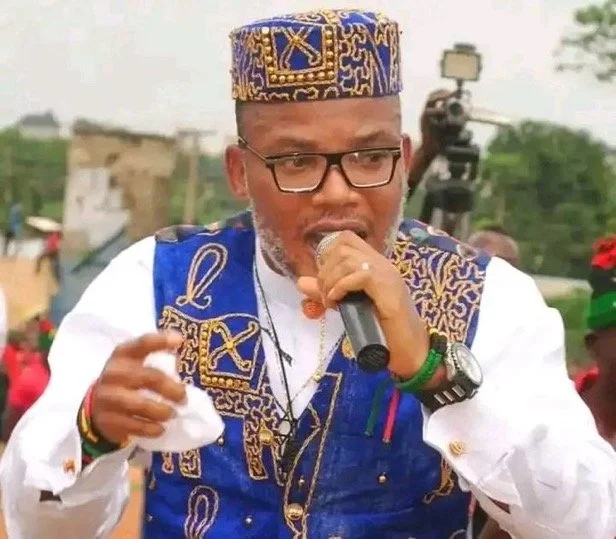The Injustice of Nigeria: Igbo Suppression in the Shadow of Nnamdi Kanu's Detention
On October 20, 2025—the fifth anniversary of the #EndSARS protests that exposed Nigeria's deep-seated issues of police brutality and governance failures—peaceful demonstrators gathered in Abuja to demand the release of Mazi Nnamdi Kanu, the leader of the Indigenous People of Biafra (IPOB). What began as a non-violent call for justice quickly escalated into chaos, with Nigerian police deploying tear gas and making arrests.
This incident is not an isolated event, but a stark illustration of the systemic suppression faced by the Igbo people, where voices advocating for self-determination and against ethnic injustices are silenced, while the government extends olive branches to far more dangerous elements. At the heart of this crackdown is Nnamdi Kanu, detained since 2021 on treason charges that have yet to result in a conviction despite his British-Biafran dual citizenship.
Kanu has been a relentless voice against the alleged Christian genocide in Nigeria, highlighting the targeted killings and displacements of Christian communities, particularly in the North, by extremist groups.
His advocacy draws attention to a crisis that the government has repeatedly downplayed or denied, insisting that claims of genocide are "false and malicious propaganda."
Yet, reports and international scrutiny suggest otherwise, with Kanu's platform, Christians in Nigeria, Christians around the world and US senators amplifying the plight of vulnerable populations in a nation where religious and ethnic tensions simmer unchecked.
The Abuja protest, led by activist Omoyele Sowore, underscores a glaring double standard in how Nigeria handles dissent. While Sowore, a Yoruba journalist and publisher of Sahara Reporters, walked away unscathed despite spearheading the demonstration, authorities arrested Kanu's brother, Emmanuel Kanu, his lawyer Aloy Ejimakor, and 11 other Biafrans—individuals tied to the Igbo separatist cause.
These detainees were swiftly remanded to Kuje prison, facing charges amid claims of unprovoked attacks, including live bullets fired at protesters.
Why spare Sowore, the visible leader, while targeting those with direct links to Kanu and the Biafran movement? This selective enforcement reeks of ethnic bias, perpetuating the marginalization of Igbos that echoes the horrors of the 1967-1970 Biafran War, where millions perished in a conflict rooted in similar grievances.Compounding this injustice are the repeated judicial directives ignored by the state. In 2022, the Court of Appeal explicitly ordered Kanu's release, a ruling that should have ended his prolonged detention.
Yet, as recently as September 26, 2025, a court rejected another bid for his freedom, allowing prosecutors to proceed with trial despite insufficient evidence presented thus far.
This defiance of court orders not only undermines the rule of law but also signals to the Igbo community that their leaders can be indefinitely held without due process, stifling any push for equity or autonomy. The hypocrisy deepens when contrasted with Nigeria's approach to actual terrorists. For over a decade, the government has engaged in negotiations, rehabilitation, and reintegration programs for Boko Haram militants through initiatives like Operation Safe Corridor and the Disarmament, Demobilization, Rehabilitation, and Reintegration (DDRR) Borno Model.
Surrendered fighters—responsible for thousands of deaths, abductions, and the displacement of millions—are screened, deradicalized, and even integrated into the military or society.
While Boko Haram, once the world's deadliest terrorist group, receives pathways to redemption, Kanu—a non-violent advocate despite lacking comparable acts of mass violence—languishes in solitary confinement.
This disparity is not mere policy; it is a deliberate strategy that favors northern insurgents over southeastern separatists, reinforcing the perception of Igbo suppression in a federation that claims equality. Nigeria's failure hinges on not addressing these ethnic fractures. The Igbo people, with their rich history of resilience and contribution to the nation, deserve better than to be treated as perpetual suspects.
Mazi Nnamdi Kanu
Releasing Nnamdi Kanu in line with court orders would be a step toward genuine reconciliation, signaling that dialogue, not detention, is the path forward. Until then, events like the Abuja crackdown will only fuel resentment, reminding us that true unity cannot be built on the foundations of selective justice and suppressed voices. The world is watching—Nigeria must choose equity over division.
Written By Nnamdi Iheukwumere




